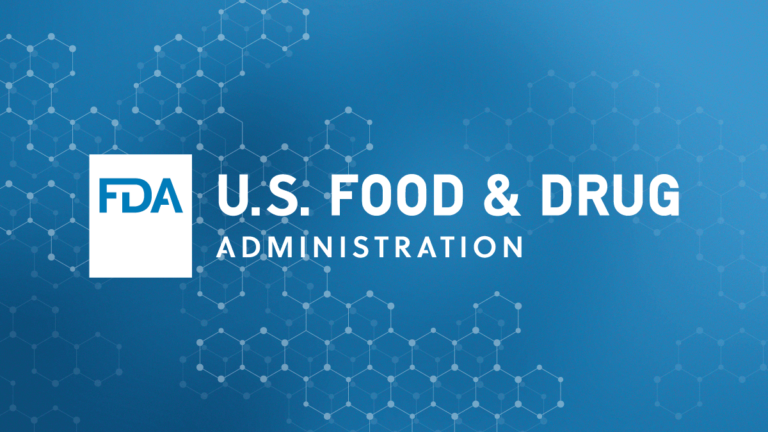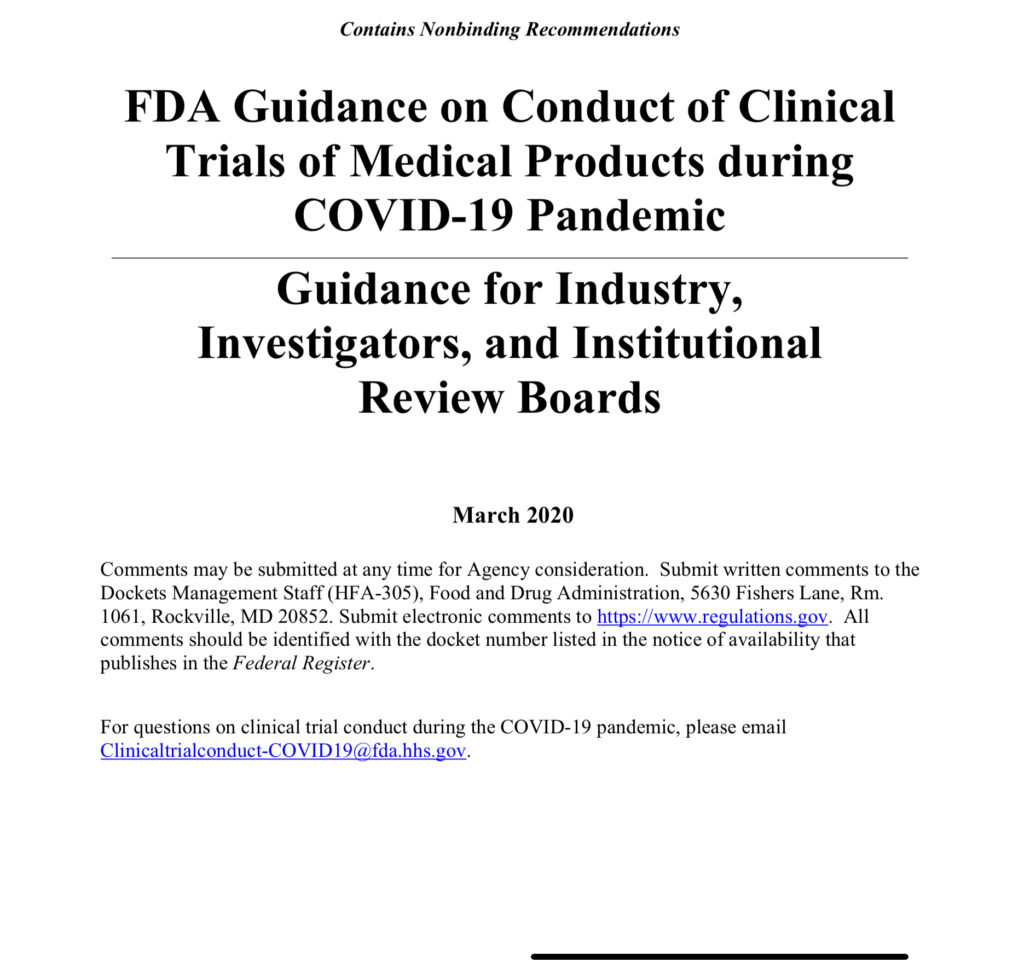In response to growing difficulties companies are expecting to face running trials, the Food and Drug Administration has issued a new guidance to help navigate the problems.
Considerations for ongoing trials:
- Ensuring the safety of trial participants is paramount. Sponsors should consider each circumstance, focusing on the potential impact on the safety of trial participants, and modify study conduct accordingly. Study decisions may include those regarding continuing trial recruitment, continuing use of the investigational product for patients already participating in the trial, and the need to change patient monitoring during the trial. In all cases, it is critical that trial participants are kept informed of changes to the study and monitoring plans that could impact them.
- Sponsors, in consultation with clinical investigators and Institutional Review Boards (IRBs)/Independent Ethics Committees (IECs), may determine that the protection of a participant’s safety, welfare, and rights is best served by continuing a study participant in the trial as per the protocol or by discontinuing the administration or use of the investigational product or even participation in the trial. Such decisions will depend on specific circumstances, including the nature of the investigational product, the ability to conduct appropriate safety monitoring, the potential impact on the investigational product supply chain, and the nature of the disease under study in the trial.
- Since trial participants may not be able to come to the investigational site for protocol- specified visits, sponsors should evaluate whether alternative methods for safety assessments (e.g., phone contact, virtual visit, alternative location for assessment, including local labs or imaging centers) could be implemented when necessary and feasible, and would be sufficient to assure the safety of trial participants. Sponsors should determine if in-person visits are necessary to fully assure the safety of trial participants (for example to carry out procedures necessary to assess safety or the safe use of the investigational product appropriately); in making the decision to continue use or administration of the investigational product, the sponsor should consider whether the safety of trial participants can be assured with the implementation of the altered monitoring approach.
- In some cases, trial participants who no longer have access to investigational product or the investigational site may need additional safety monitoring (e.g. withdrawal of an active investigational treatment).
- The need to put new processes in place or to modify existing processes will vary by the protocol and local situation. For example, this assessment could include consideration of whether it is appropriate to delay some assessments for ongoing trials, or, if the study cannot be properly conducted under the existing protocol, whether to stop ongoing recruitment, or even withdraw trial participants.
- COVID-19 screening procedures that may be mandated by the health care system in which a clinical trial is being conducted do not need to be reported as an amendment to the protocol even if done during clinical study visits unless the sponsor is incorporating the data collected as part of a new research objective.
- Changes in a protocol are typically not implemented before review and approval by the IRB/IEC, and in some cases, by FDA. Sponsors and clinical investigators are encouraged to engage with IRBs/IEC as early as possible when urgent or emergent changes to the protocol or informed consent are anticipated as a result of COVID-19. Such changes to the protocol or investigational plan to minimize or eliminate immediate hazards or to protect the life and well-being of research participants (e.g., to limit exposure to COVID-19) may be implemented without IRB approval or before filing anamendment to the IND or IDE, but are required to be reported afterwards. The FDA encourages sponsors and investigators to work with their IRBs to prospectively define procedures to prioritize reporting of deviations that may impact the safety of trial participants.
- The implementation of alternative processes should be consistent with the protocol to the extent possible, and sponsors and clinical investigators should document the reason for any contingency measures implemented. Sponsors and clinical investigators should document how restrictions related to COVID-19 led to the changes in study conduct and duration of those changes and indicate which trial participants were impacted and how those trial participants were impacted.
- Changes in study visit schedules, missed visits, or patient discontinuations may lead to missing information (e.g., for protocol-specified procedures). It will be important to capture specific information in the case report form that explains the basis of the missing data, including the relationship to COVID-19 for missing protocol-specified information (e.g., from missed study visits or study discontinuations due to COVID-19). This information, summarized in the clinical study report, will be helpful to the sponsor and FDA.
- If scheduled visits at clinical sites will be significantly impacted, certain investigational products, such as those that are typically distributed for self-administration, may be amenable to alternative secure delivery methods. For other investigational products that are normally administered in a health care setting, consulting FDA review divisions on plans for alternative administration (e.g., home nursing or alternative sites by trained but non-study personnel) is recommended. In all cases, existing regulatory requirements for maintaining investigational product accountability remain and should be addressed and documented.
- With respect to efficacy assessments, FDA recommends consultation with the appropriate review division regarding protocol modifications for the collection of efficacy endpoints, such as use of virtual assessments, delays in assessments, and alternative collection of research-specific specimens, if feasible. For individual instances where efficacy endpoints are not collected, the reasons for failing to obtain the efficacy assessment should be documented (e.g., identifying the specific limitation imposed by COVID-19 leading to the inability to perform the protocol-specified assessment).
- If changes in the protocol will lead to amending data management and/or statistical analysis plans, the sponsor should consider doing so in consultation with the applicableFDA review division. Prior to locking the database, sponsors should address in the statistical analysis plan how protocol deviations related to COVID-19 will be handled for the prespecified analyses.
- If planned on-site monitoring visits are no longer possible, sponsors should consider optimizing use of central and remote monitoring programs to maintain oversight of clinical sites


